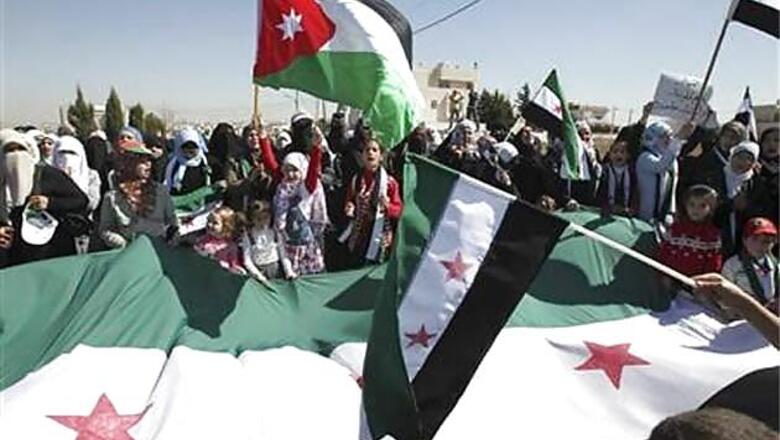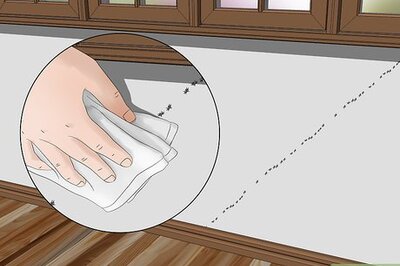
views
Beirut: Syrian forces pounded the battered city of Homs with tank and mortar fire and troops pummelled several other rebel strongholds on Saturday, leaving at least 24 dead, opposition activists said.
With the bloodshed showing no signs of abating, the UN-Arab League peace envoy for Syria, Kofi Annan, flew to Moscow, seeking Russian backing for his efforts to secure a ceasefire.
Western and Arab states want Syrian President Bashar al-Assad to stand down but Russia, a long-time ally of Syria, has put the onus on the armed rebels and their foreign backers to make the first move.
In a statement ahead of Sunday's meeting between Annan and Russian President Dmitry Medvedev, the Kremlin said it would be hard to enforce a halt to the violence "until external armed and political support of the opposition is terminated".
More than a year after the start of the uprising against Assad, the prospect of a negotiated peace seemed more remote than ever, with clashes reported in numerous locations.
At least 10 people were killed by explosions and sniper fire in Homs, the epicentre of the anti-Assad revolt, said activists who accused Syrian forces of shelling residential areas in the centre of the city indiscriminately.
"The shelling started like it does every morning, for no reason. They are using mortar and tank fire on many neighbourhoods of old Homs," an activist in Homs's Bab Sbaa district told Reuters via Skype.
He said most residents in the area had fled to safer districts and many were trying to escape the city altogether.
The Syrian government says rebels have killed about 3,000 members of the security forces and blames the violence on "terrorist" gangs. The official Sana news agency said the bodies of 18 "army martyrs", killed in various clashes, were buried on Saturday.
Rebels under fire
Syrian troops have repeatedly targeted Homs, Syria's third largest city, and said last month they had regained control of Baba Amr, a large neighbourhood held by rebels for several months. However, a surge in violence in other neighbourhoods this week suggested the army was struggling to keep control.
The Homs activist, who declined to be named for fear of reprisals, said the opposition Free Syrian Army had also not been able to reestablish its hold on parts of the city.
"The Free Syrian Army had been in Bab Sbaa when the army started shelling the area four days ago and they weren't able to block the army raids because they were getting hit by mortars at the same time that armoured vehicles were coming in," he said.
"We only have a few rebels here left. There is nothing they can do," he added.
It was impossible to verify the reports independently. Syrian authorities have prevented foreign journalists and human rights workers from entering affected areas.
Further to the north, security forces killed at least five people and wounded dozens more in raids on Saraqib, which lies in Idlib province bordering Turkey, activists said.
"There are dozens of tanks and armoured vehicles storming Saraqib now and there is heavy artillery fire," an activist called Manhal said via Skype.
Mortars and heavy artillery fire also hit the city of Qusair, in Homs province, killing three civilians. There were reports of overnight clashes in the city of Douma, close to the capital Damascus.
In the southern province of Deraa, birthplace of the revolt, the Syrian Observatory for Human Rights said a man was shot dead at a checkpoint in an area where a soldier had been gunned down. Three other soldiers were killed in an attack in the northeastern province of Hasaka, it said.
Russian complaints
Deep divisions within opposition ranks have weakened the anti-Assad front. In a bid to tackle the problem at a military level, a senior army defector said on Saturday that all rebel groups would work under the leadership of the Free Syrian Army.
"In these critical times that our beloved Syria is passing through, it is necessary that all noble people of this nation work to unite all efforts at toppling this corrupt regime," Brigadier General Mustafa Sheikh said in a video message.
Sheikh said he would head the group's military council while FSA leader Colonel Riad al-Asaad, who was sitting alongside him, would take charge of the fighting forces.
Annan is leading international efforts to avoid any escalation and has drawn up a six-point plan, including demands for a ceasefire, the immediate withdrawal of heavy armour from residential areas and access for humanitarian assistance.
Attempts to halt the conflict have been stymied by divisions between world powers. Russia and China have vetoed two UN resolutions highly critical of Damascus.
Moscow and Beijing did support a Security Council resolution earlier this week endorsing Annan's mission. The former UN chief is due to fly to China after his Russia talks.
Moscow has accused the West of being too one-sided in the conflict, arguing that outside support for rebels is fuelling the fighting in Syria, which hosts a Russian naval base.




















Comments
0 comment